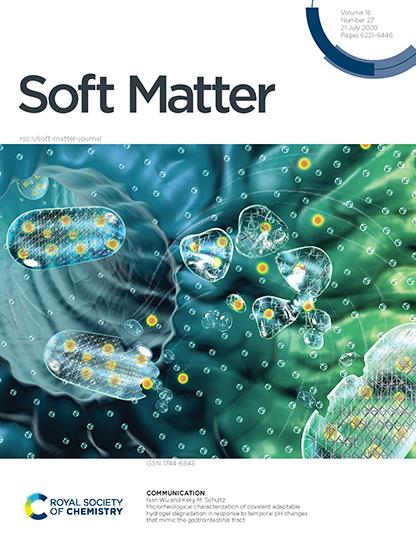In research published in Soft Matter, Lehigh University rheologists mimic pH environment of GI tract to shed light on pharmaceutical potential of covalent adaptable hydrogels (CAHs)

Credit: Courtesy of Soft Matter/Illustration by Sayo Studio LLC
An emerging hydrogel material with the capacity to degrade and spontaneously reform in the gastrointestinal tract could help researchers develop more effective methods for oral drug delivery.
“The majority of drugs and nutrients are absorbed into the body in the intestines, but to get there, they have to traverse the stomach–a very acidic, harsh environment that can interfere with the active molecules in pharmaceuticals,” says Kelly Schultz, an associate professor of chemical and biomolecular engineering in Lehigh University’s P.C. Rossin College of Engineering and Applied Science.
Schultz and fourth-year chemical engineering PhD student Nan Wu are studying covalent adaptable hydrogels (CAHs), which are being designed to release molecules as they lose polymer in the stomach but then re-gel on their own, which protects the molecules and allows them to stay active for targeted delivery in the intestines. The team’s microrheology research is featured in an article and inside cover illustration in the current issue of Soft Matter.
To characterize the material and provide insight into its pharmaceutical potential, Wu has repurposed a microfluidic device originally developed in Schultz’s lab for research into fabric and home care products to create a “GI tract-on-a-chip.” The experimental setup allows her to exchange the fluid environment around the gel to mimic the pH environment of all the organs in the GI tract, simulating how the material would react over time if ingested.
Using microrheology, Wu collects microscopy data and measures how much particles within the gel wiggle, with some experiments taking hours and others spanning days, depending on the digestive organ she is replicating. Wu tracks the particles using an algorithm that yields scientifically meaningful information on the properties of the material, which was originally developed by University of Colorado at Boulder professor Kristi S. Anseth.
“CAHs exhibit unusual spontaneous re-gelation that is really surprising,” Schultz says. “Typically, gels won’t degrade and then reform without any added stimuli as these do. We’ve demonstrated viability of CAHs as means of oral drug and nutrient delivery, and now we’re starting to work on molecular release studies and adding in other components to make the experiments more complex.”
Wu has been investigating these materials over the course of her entire PhD studies, says Schultz. “She’s doing amazing work and is committed to understanding every aspect of the research.”
Schultz’s research lab focuses on the characterization of colloidal and polymeric gel scaffolds and the development of new techniques to characterize these complex systems, which play important roles in fields such as health care and consumer products.
“What we do in biomaterials is somewhat unique: There’s a lot of work on the cross-linking chemistry and actually developing these materials, and there’s a lot of animal research that implants and tests them, but there’s not that much work in the middle. A great deal of mystery lies between designing a material and understanding what’s going on when it’s working. We’re trying to find new ways that we can replicate what’s going on inside of an animal or a person and collect important measurements to connect the dots and inform further studies.”
Research supported in part by National Institute of General Medical Sciences of the National Institutes of Health under award number R15GM119065. Content is solely responsibility of authors and does not necessarily represent official views of NIH.
About Kelly M. Schultz
Kelly M. Schultz is an associate professor in the Department of Chemical and Biomolecular Engineering at Lehigh University. She earned her BS in chemical engineering from Northeastern University (2006) and PhD in chemical engineering with Professor Eric Furst from the University of Delaware (2011) as a National Science Foundation graduate research fellow. While at Delaware, she was invited to speak in the American Chemical Society Excellence in Graduate Polymers Research Symposium and was selected as the Fraser and Shirley Russell Teaching Fellow. Following her PhD, she was a Howard Hughes Medical Institute postdoctoral research associate at the University of Colorado at Boulder working in the laboratory of Professor Kristi Anseth. As a postdoc, she was invited to participate in the Distinguished Young Scholars Summer Seminar Series at the University of Washington. She joined Lehigh as an assistant professor in 2013 and was a P.C. Rossin Assistant Professor from 2016 to 2018. Schultz was named one of TA Instruments Distinguished Young Rheologists in 2014 and was recognized by the NSF Faculty Early Career Development (CAREER) Program in 2018. She received Lehigh’s Libsch Early Career Research Award in 2019 and the Excellence in Research Scholarship & Leadership Award from the P.C. Rossin College of Engineering and Applied Sciences in 2020. Schultz and her research group study emerging hydrogel materials developed for biological applications, such as wound healing and tissue regeneration.
Related Links:
- Faculty Profile: Kelly Schultz
- Soft Matter: Microrheological characterization of covalent adaptable hydrogel degradation in response to temporal pH changes that mimic the gastrointestinal tract
- Rossin College: Schultz Lab
###
Media Contact
Katie Kackenmeister
[email protected]
Original Source
https:/
Related Journal Article
http://dx.




